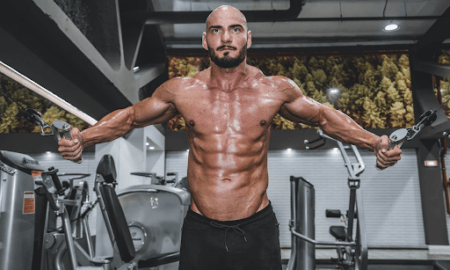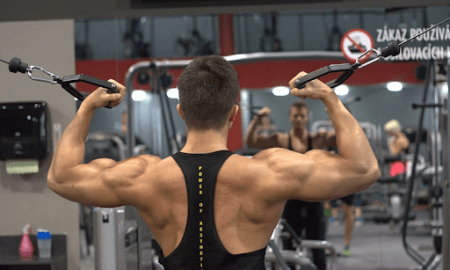Bodybuilders often have a protein-and-carb drink either before or after training. Drinking it prior to training gives you greater amino acid entry—particularly branched-chain amino acids—into muscle and may diminish excess muscle damage from training. Having the drink after the workout promotes a greater insulin response. Lifting weights helps your body secrete testosterone, but that effect is abolished when you take in protein and carbs after training, especially in younger men.
A new study tested the effects of taking protein before and after a weight-training exercise. Men aged 57 to 72 were given 15 grams of either whey protein or a placebo before and after a weight-training bout. They did leg presses only: five sets of 10, with two minutes of rest between sets. Biopsies of muscle tissue were extracted from them before and at one and 48 hours after training.
Taking the protein before and after training blocked the response of both active and total testosterone to the exercise, much the way that it happens in younger men. Still, weight training increased the number of muscle androgen receptors, which would have made the trained muscle more responsive to the anabolic effects of testosterone. The question is, What blunted the testosterone release in those who got the protein?
One suggestion is that there was increased uptake into active muscle cells. Another possibility is that more testosterone was cleared from the blood. The mere process of digesting the protein can divert blood from muscle to the gastrointestinal tract, which may lessen muscle uptake of hormones during training. Taking in nutrients before training may also decrease testicular circulation, which would dampen testosterone secretion. Researchers found increased androgen receptors in the subjects 48 hours after training.
Researchers also tested whether the protein intake affected levels of insulinlike growth hormone 1, a potent anabolic hormone. IGF-1 has three variants, two of which are produced locally in muscle, where they affect muscle repair by stimulating satellite cell activity, and a third, which is generated in the liver and has whole-body effects. Limited protein and calorie intake blunts IGF-1 release. In this study, getting protein prior to and after training didn’t affect muscle IGF-1 but may have affected the variant produced in the liver. By the way, taking creatine does appear to support muscle IGF-1 activity.
The training done by the subjects appeared to affect androgen receptors in type 1 more than in type 2 fibers. Type 2s are usually considered more conducive to gains in muscle size and strength than type 1s, which are considered endurance fibers. That’s because type 1 fibers actually have more androgen receptors than type 2 fibers and thus are more responsive to androgens.
The significant bodybuilding aspect of the study is that taking in protein before and after training doesn’t adversely affect muscle gains, despite the temporary blunting of testosterone release. The testosterone rebounds in a short time, and the added androgen receptor activity induced by weight training winds up making the anabolic effects of testosterone more potent, even in older men. IM
Hulmi, J.J., et al. (2008). Androgen receptors and testosterone in men—effects of protein ingestion, resistance exercise, and fiber type. J Ster Biochem Molecul Biol. 110(1-2):130.




















You must be logged in to post a comment Login